(WARNING: This video may contain PTSD triggers)
My husband Chris (31 years old) is a US-Army Veteran who was deployed in Support of Operation Enduring Freedom and is in desperate need of help. He is very humble and would never ask for it, so I am going to do it for him, because he so very much deserves it.
We have been married for 8 years, and have 3 wonderful children (8, 5, and 3 years old). He is the best husband a wife could ever ask for and the best dad for our 3 little ones. Our 5 year old was diagnosed with Asperger Syndrome, which puts a lot of extra stress on my husband who has been diagnosed with severe Post Traumatic Stress Disorder (PTSD) after he returned from Afghanistan in April 2006. He has been through a lot over there, including being hit by several IEDs and being shot at. He has been in psychological and psychiatric care for several years. He has been prescribed many medications including anti depressants and anti psychotics, but the side effects so far have far outweigh the regretably minimal benefit that they have had. He is still trying different medications when the doctors allow, but a long period without medication is required in between new trials.
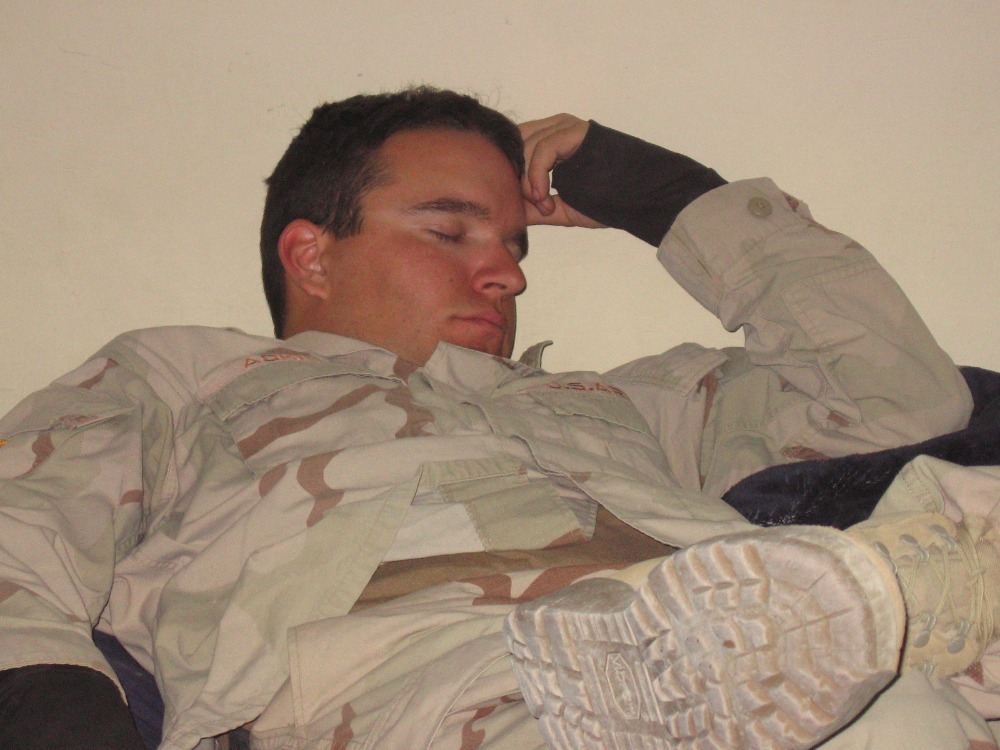 (Source: Personal Pictures)
(Source: Personal Pictures)
Some of our daily struggles with his PTSD include:
- Anxiety: This could be triggered by a sound, a smell, or a situation (like crowds).
- Sleep disturbance: I am not sure if Chris sleeps at all at night, but more often then not he will wake up screaming from night terrors, wandering around the house looking for his weapon, or trying to protect me and the kids from people he imagines attacking us.
- Memory and concentration issues: We could be driving 90mph on the Autobahn and Chris will suddenly forget where we are. He'll follow a street in Afghanistan he sees with his minds eye instead of following the street we are on. He also randomly blacks out during conversations, no matter if we are attending a family party or a work dinner. He has trouble concentrating on day to day things and remembering dates, times and schedules.
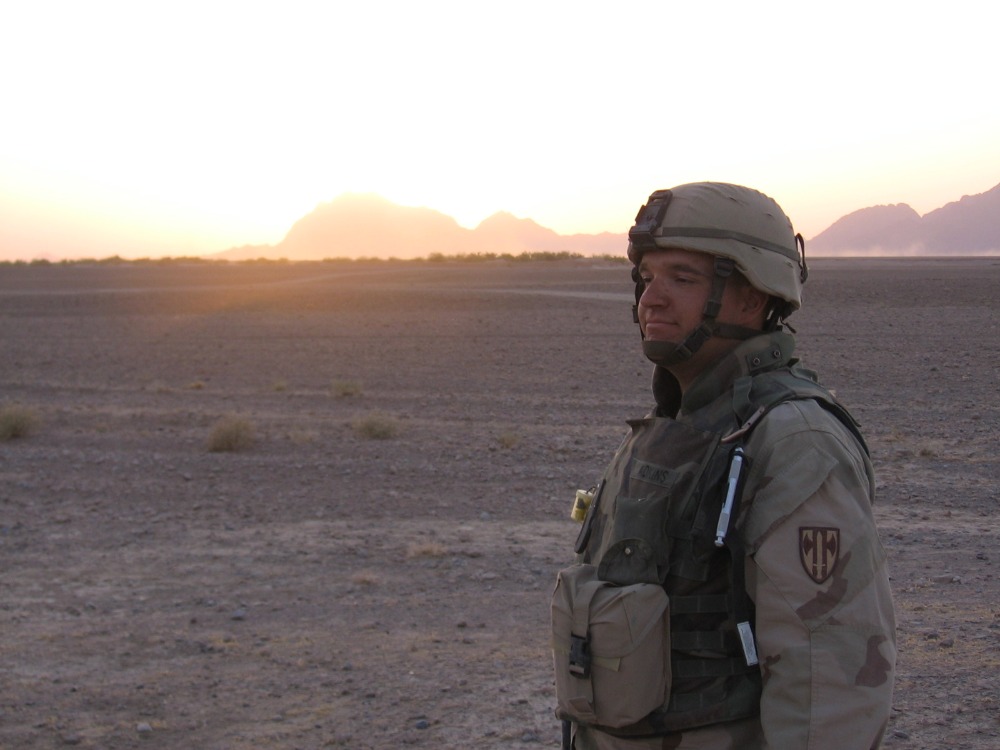 (Source: Personal Pictures)
(Source: Personal Pictures)
We have been informed by several nonprofit organizations providing service dogs to those who have served, that he would qualify to get a PTSD service dog. Sadly, they have all informed us that they are unable to give him the help that he needs, and has earned, because we live outside the continental United States. I am German (I met my husband while he was stationed over here) and I guess love made him stay.
Service dogs have to train together with the veteran, since every case of PTSD is different and they have to get used to their owner over the training period of about 18 month. Chris, however, is unable to fly to the U.S., because of his PTSD. The locked doors, confined space, and number of people make it a situation that his Psychologist said would be very damaging to his metal health. Even if he were capable of making the trip, he would have to quit his job as a software developer to spend the next 1.5 years in the U.S. to train his service dog and be trained to use the service dog. He would also have to be away from his family, which would cause undue stress and could also worsen his condition.
After years of research we finally found an organization who trains PTSD service dogs for soldiers in Germany. (German link: PTSD dog training Germany ). However training those dogs is very expensive. The training costs 20,000 Euros (approximately $23,000), as well as 2,000 Euros for the puppy. Additionally, there are follow up costs for vet bills, food, and additional training. Neither our health insurance, the Department of Veterans Affairs, nor the nonprofit organizations based in the US are willing, or able, to help us. We would love to go with the company based in Germany. We have had a lot of long discussion with them and since they are currently working together with soldiers they have the experience needed to train the type of dog that would be a saving grace for our family.
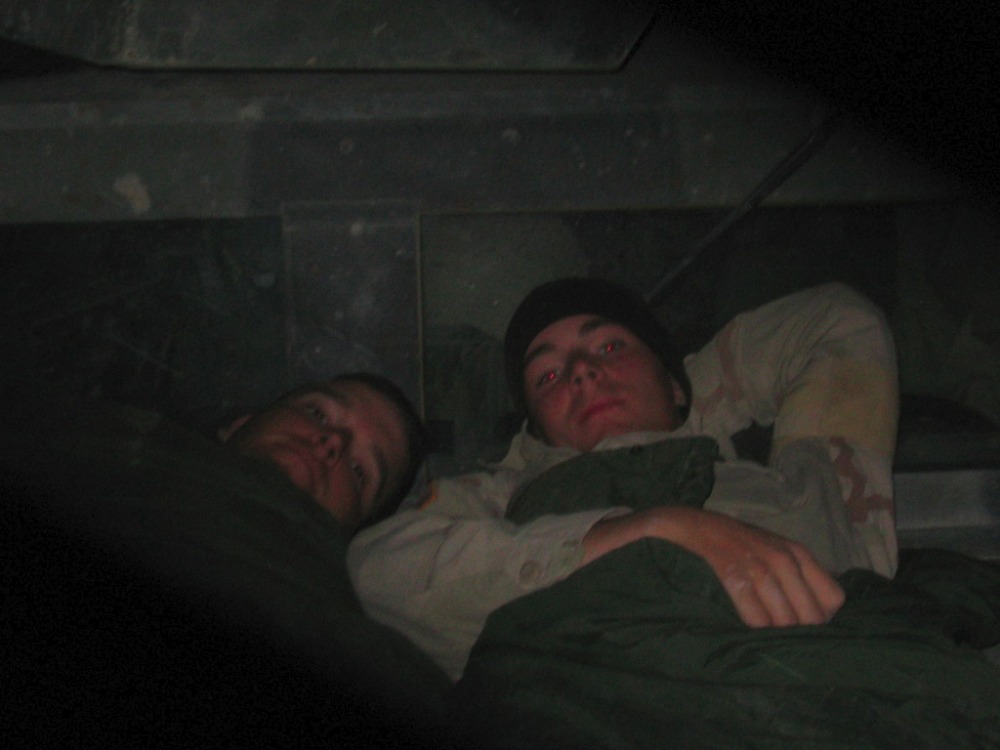 (Source: Personal Pictures)
(Source: Personal Pictures)
My husband served his country, just like ever other veteran, and I strongly believe he shouldn't be neglected simply for staying in Germany for loves sake.
Chris is one of the hardest working people I know, he does all he can, and even more, to provide for his family. He has never been unemployed a day in his life. We simply don't have that amount of money with three kids and a mortgage.
 (Source: Personal Pictures)
(Source: Personal Pictures)
A service dog would help Chris get back to a normal life. It would help our family to find a way back to normalcy. It would help my husband to finally come home. Please help a man who has seen too much, see the good things in life again.
So we really need your help. Every single Dollar and Euro counts. You do not need to make a huge donation to help. After all if we can find 30.000 people to donate $1 or 1 Euro it will be enough.
We appreciate every single person helping, however small your donation will be. It truly means the world to us.
Thank you so much, with tons of love from Munich, Germany.
Anya.
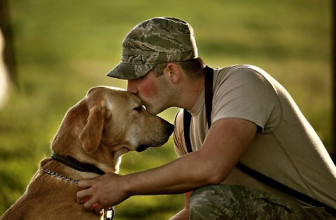 (Source: Google Images)
(Source: Google Images)
Some additional information:
What is PTSD:
"Posttraumatic stress disorder (PTSD) is an anxiety disorder that can develop after a person is exposed to one or more traumatic events, such as major stress, sexual assault, warfare, or other threats on a person's life. Symptoms include disturbing recurring flashbacks, avoidance or numbing of memories of the event, and hyperarousal, continue for more than a month after the occurrence of a traumatic event." - Wikipedia
The symptoms of PTSD are debilitating not only for the veteran, but also for the soldier's family as they try to make the adjustment to civilian life. Some PTSD sufferers may experience:
- Panic attacks
- Anxiety
- Depression
- Bad Nightmares
- Flashbacks
- Agoraphobia (anxiety in crowded places or places that are difficult to escape )
- Irritability
- Hypervigilance
- Sleep disturbance
- Suicidal thoughts
- Reclusive behavior
Every 65 minutes, a veteran commits suicide.
Studies show that up to 80% of veterans struggling with PTSD or Traumatic Brain Injury (TBI) symptoms improve with the help of an assistance dog. Some patients are able to reduce or discontinue medicines prescribed to treat the above symptoms.
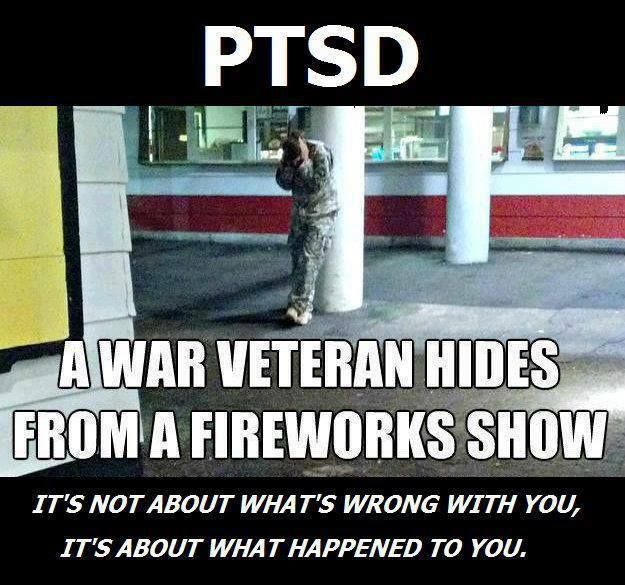 (Source: Google Images)
(Source: Google Images)
How can a PTSD service dog help?:
According to the Psychiatric Service Dog Society, a trained service dog can help an individual with PTSD or other depressive or anxiety disorders in the following ways:
- Help overcome reclusiveness by accompanying the individual on trips outside the home
- Awaken an individual suffering from night terrors
- Turn on a light to alleviate night terrors
- Help with hypervigilance by searching a room for intruders
- Interruption of dissociative spell
- Alert and intervene or distract in moments of emotional escalation
What does the PTSD service dog do?:
- Coping with anxiety
Service animals are trained specifically to assist vets as they enter anxiety-producing environments that may include places such as restaurants, grocery stores, buses, etc. When a veteran goes into a crowded environment, the service dog will stay between him or her and any person approaching too close. This creates a calm, yet friendly, "barrier."
A service dog will also redirect their partner's thoughts elsewhere should they sense any anxiety they may be feeling.
- Sleep disturbances
For veterans that suffer from nightmares, their service dog may nudge them awake with kisses or snuggle up close so that their calm comfort will remind the soldier they are safe. This is the technique that was so beautifully demonstrated on the winning commercial at the bottom.
In some cases, a PTSD service dog can alert their partner when it's time to go to bed and even bring them sleep medications as a not-so-subtle hint.
- Anger and rage management
PTSD service dogs have the ability to sense when a veteran is becoming agitated and angry. If this happens, the dog will alert his partner that they are becoming angry and then redirect them.
Some dogs can even anticipate triggers to rage and distract the veteran to keep them from reacting.
- Memory issues
Blacking out during a triggering moment or losing track of common items can be a problem for someone with PTSD or TBI. Service dogs can lead a temporarily-mentally impaired person to a safe area and help retrieve lost objects. The dogs can also remind their partner about routines.
- Biomedical improvements
PTSD service dogs not only help with emotional and mental support. They can also have a tangible effect on a veteran's physical health by decreasing blood pressure and heart rate. Simultaneously, a veteran paired with a service dog have been documented to have increased levels of serotonin in the brain.
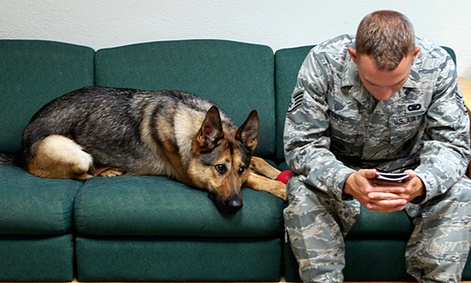 (Source: Google Images)
(Source: Google Images)
What the money is needed for:
2.000 Euros - for the actual puppy. The puppy has to be tested to see if it will be able to work as a PTSD service dog.
20.000 Euros - Training. Done by professionals working with soldiers and veterans. It will take at least 18 month of daily training until the puppy becomes an PTSD service dog.
5.630 Euros - For everything else. This includes vet bills, room and boarding as well as travel expenses for Chris during those 18 month.
2.370 Euro - Go fund me and stripe fees 7.9%
There is no timelimit in reaching our goal, but keep in mind that training alone takes at least 18 month, and the sooner we can help Chris, the better.
Any additional money will be spent for ongoing training, pet food, vet bills.
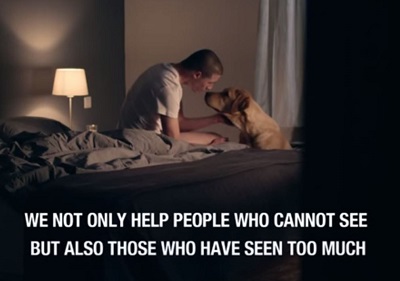 (Source: Google Images)
(Source: Google Images)
A word from Chris:
"I am really not sure what to think about this. While I know that a PTSD service dog would do a lot to help both my family and I, I am still uncomfortable asking for this much help from everyone. The sad truth,however, is that I don't know how else we could make this happen. The charities that are supposed to help Veterans have abandonded us, the VA feels that these dogs are too expensive, and we are simply not able to carry the costs ourselves. I am truly humbled and would like to thank everyone that has helped out with this. Any benefit that this can offer to my children, through helping me, is worth far more than I can even express. Thank you!"
(WARNING: This video may contain PTSD triggers)
My husband Chris (31 years old) is a US-Army Veteran who was deployed in Support of Operation Enduring Freedom and is in desperate need of help. He is very humble and would never ask for it, so I am going to do it for him, because he so very much deserves it.
We have been married for 8 years, and have 3 wonderful children (8, 5, and 3 years old). He is the best husband a wife could ever ask for and the best dad for our 3 little ones. Our 5 year old was diagnosed with Asperger Syndrome, which puts a lot of extra stress on my husband who has been diagnosed with severe Post Traumatic Stress Disorder (PTSD) after he returned from Afghanistan in April 2006. He has been through a lot over there, including being hit by several IEDs and being shot at. He has been in psychological and psychiatric care for several years. He has been prescribed many medications including anti depressants and anti psychotics, but the side effects so far have far outweigh the regretably minimal benefit that they have had. He is still trying different medications when the doctors allow, but a long period without medication is required in between new trials.
 (Source: Personal Pictures)
(Source: Personal Pictures)Some of our daily struggles with his PTSD include:
- Anxiety: This could be triggered by a sound, a smell, or a situation (like crowds).
- Sleep disturbance: I am not sure if Chris sleeps at all at night, but more often then not he will wake up screaming from night terrors, wandering around the house looking for his weapon, or trying to protect me and the kids from people he imagines attacking us.
- Memory and concentration issues: We could be driving 90mph on the Autobahn and Chris will suddenly forget where we are. He'll follow a street in Afghanistan he sees with his minds eye instead of following the street we are on. He also randomly blacks out during conversations, no matter if we are attending a family party or a work dinner. He has trouble concentrating on day to day things and remembering dates, times and schedules.
 (Source: Personal Pictures)
(Source: Personal Pictures)We have been informed by several nonprofit organizations providing service dogs to those who have served, that he would qualify to get a PTSD service dog. Sadly, they have all informed us that they are unable to give him the help that he needs, and has earned, because we live outside the continental United States. I am German (I met my husband while he was stationed over here) and I guess love made him stay.
Service dogs have to train together with the veteran, since every case of PTSD is different and they have to get used to their owner over the training period of about 18 month. Chris, however, is unable to fly to the U.S., because of his PTSD. The locked doors, confined space, and number of people make it a situation that his Psychologist said would be very damaging to his metal health. Even if he were capable of making the trip, he would have to quit his job as a software developer to spend the next 1.5 years in the U.S. to train his service dog and be trained to use the service dog. He would also have to be away from his family, which would cause undue stress and could also worsen his condition.
After years of research we finally found an organization who trains PTSD service dogs for soldiers in Germany. (German link: PTSD dog training Germany ). However training those dogs is very expensive. The training costs 20,000 Euros (approximately $23,000), as well as 2,000 Euros for the puppy. Additionally, there are follow up costs for vet bills, food, and additional training. Neither our health insurance, the Department of Veterans Affairs, nor the nonprofit organizations based in the US are willing, or able, to help us. We would love to go with the company based in Germany. We have had a lot of long discussion with them and since they are currently working together with soldiers they have the experience needed to train the type of dog that would be a saving grace for our family.
 (Source: Personal Pictures)
(Source: Personal Pictures)My husband served his country, just like ever other veteran, and I strongly believe he shouldn't be neglected simply for staying in Germany for loves sake.
Chris is one of the hardest working people I know, he does all he can, and even more, to provide for his family. He has never been unemployed a day in his life. We simply don't have that amount of money with three kids and a mortgage.
 (Source: Personal Pictures)
(Source: Personal Pictures)A service dog would help Chris get back to a normal life. It would help our family to find a way back to normalcy. It would help my husband to finally come home. Please help a man who has seen too much, see the good things in life again.
So we really need your help. Every single Dollar and Euro counts. You do not need to make a huge donation to help. After all if we can find 30.000 people to donate $1 or 1 Euro it will be enough.
We appreciate every single person helping, however small your donation will be. It truly means the world to us.
Thank you so much, with tons of love from Munich, Germany.
Anya.
 (Source: Google Images)
(Source: Google Images)Some additional information:
What is PTSD:
"Posttraumatic stress disorder (PTSD) is an anxiety disorder that can develop after a person is exposed to one or more traumatic events, such as major stress, sexual assault, warfare, or other threats on a person's life. Symptoms include disturbing recurring flashbacks, avoidance or numbing of memories of the event, and hyperarousal, continue for more than a month after the occurrence of a traumatic event." - Wikipedia
The symptoms of PTSD are debilitating not only for the veteran, but also for the soldier's family as they try to make the adjustment to civilian life. Some PTSD sufferers may experience:
- Panic attacks
- Anxiety
- Depression
- Bad Nightmares
- Flashbacks
- Agoraphobia (anxiety in crowded places or places that are difficult to escape )
- Irritability
- Hypervigilance
- Sleep disturbance
- Suicidal thoughts
- Reclusive behavior
Every 65 minutes, a veteran commits suicide.
Studies show that up to 80% of veterans struggling with PTSD or Traumatic Brain Injury (TBI) symptoms improve with the help of an assistance dog. Some patients are able to reduce or discontinue medicines prescribed to treat the above symptoms.
 (Source: Google Images)
(Source: Google Images)How can a PTSD service dog help?:
According to the Psychiatric Service Dog Society, a trained service dog can help an individual with PTSD or other depressive or anxiety disorders in the following ways:
- Help overcome reclusiveness by accompanying the individual on trips outside the home
- Awaken an individual suffering from night terrors
- Turn on a light to alleviate night terrors
- Help with hypervigilance by searching a room for intruders
- Interruption of dissociative spell
- Alert and intervene or distract in moments of emotional escalation
What does the PTSD service dog do?:
- Coping with anxiety
Service animals are trained specifically to assist vets as they enter anxiety-producing environments that may include places such as restaurants, grocery stores, buses, etc. When a veteran goes into a crowded environment, the service dog will stay between him or her and any person approaching too close. This creates a calm, yet friendly, "barrier."
A service dog will also redirect their partner's thoughts elsewhere should they sense any anxiety they may be feeling.
- Sleep disturbances
For veterans that suffer from nightmares, their service dog may nudge them awake with kisses or snuggle up close so that their calm comfort will remind the soldier they are safe. This is the technique that was so beautifully demonstrated on the winning commercial at the bottom.
In some cases, a PTSD service dog can alert their partner when it's time to go to bed and even bring them sleep medications as a not-so-subtle hint.
- Anger and rage management
PTSD service dogs have the ability to sense when a veteran is becoming agitated and angry. If this happens, the dog will alert his partner that they are becoming angry and then redirect them.
Some dogs can even anticipate triggers to rage and distract the veteran to keep them from reacting.
- Memory issues
Blacking out during a triggering moment or losing track of common items can be a problem for someone with PTSD or TBI. Service dogs can lead a temporarily-mentally impaired person to a safe area and help retrieve lost objects. The dogs can also remind their partner about routines.
- Biomedical improvements
PTSD service dogs not only help with emotional and mental support. They can also have a tangible effect on a veteran's physical health by decreasing blood pressure and heart rate. Simultaneously, a veteran paired with a service dog have been documented to have increased levels of serotonin in the brain.
 (Source: Google Images)
(Source: Google Images)What the money is needed for:
2.000 Euros - for the actual puppy. The puppy has to be tested to see if it will be able to work as a PTSD service dog.
20.000 Euros - Training. Done by professionals working with soldiers and veterans. It will take at least 18 month of daily training until the puppy becomes an PTSD service dog.
5.630 Euros - For everything else. This includes vet bills, room and boarding as well as travel expenses for Chris during those 18 month.
2.370 Euro - Go fund me and stripe fees 7.9%
There is no timelimit in reaching our goal, but keep in mind that training alone takes at least 18 month, and the sooner we can help Chris, the better.
Any additional money will be spent for ongoing training, pet food, vet bills.
 (Source: Google Images)
(Source: Google Images)A word from Chris:
"I am really not sure what to think about this. While I know that a PTSD service dog would do a lot to help both my family and I, I am still uncomfortable asking for this much help from everyone. The sad truth,however, is that I don't know how else we could make this happen. The charities that are supposed to help Veterans have abandonded us, the VA feels that these dogs are too expensive, and we are simply not able to carry the costs ourselves. I am truly humbled and would like to thank everyone that has helped out with this. Any benefit that this can offer to my children, through helping me, is worth far more than I can even express. Thank you!"
(WARNING: This video may contain PTSD triggers)
